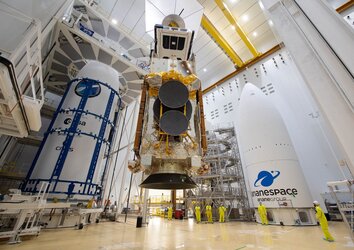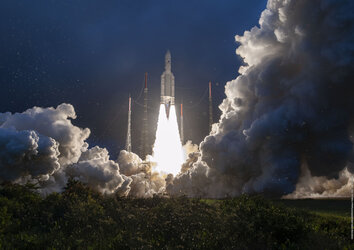Innovative data satellite enters commercial service
A large data-driven telecommunications satellite that uses innovative technology to keep cool as well as other innovations – developed under an ESA Partnership Project – has started its commercial service.
The satellite will provide broadband connectivity for commercial shipping, aviation, governments and enterprises through its operator, SES, as well connecting underserved areas and accelerating digital inclusion.
Called SES-17, it was launched on 23 October 2021 and spent the next six months navigating into geostationary orbit.

The very high throughput SES-17 belongs to a new generation of data intensive satellites and, with its new fifth-generation digital transparent processor, is able to deliver up to ten times more capacity than traditional satellites with unmatched flexibility and efficiency.
Processing large volumes of data generates heat within the spacecraft that must be dissipated for the satellite to continue long-lasting and reliable operations. Engineering teams under the ESA Neosat Partnership Project with satellite manufacturer Thales Alenia Space developed an innovative thermal cooling system – the two-phase mechanically pumped loop – that is able to circulate fluid refrigerant to remove heat. It is a first of its kind to be featured on a large commercial telecommunications satellite.
ESA Partnership Projects help to develop sustainable end-to-end systems up to in-orbit validation.
ESA’s Neosat programme comprises both Spacebus Neo by Thales Alenia Space and Eurostar Neo by Airbus and is managed jointly by ESA and the French Space Agency CNES. It includes development up to in-orbit validation of new satellite product lines for both companies, allowing the European space industry to deliver competitive satellites for the global commercial satellite market.
Some 16 Neosat satellites have now been sold by European companies, and the programme is predicted to generate more than 20 times the return on investment to its 12 participating states and their space companies, according to an independent analysis by Euroconsult.















 Germany
Germany
 Austria
Austria
 Belgium
Belgium
 Denmark
Denmark
 Spain
Spain
 Estonia
Estonia
 Finland
Finland
 France
France
 Greece
Greece
 Hungary
Hungary
 Ireland
Ireland
 Italy
Italy
 Luxembourg
Luxembourg
 Norway
Norway
 The Netherlands
The Netherlands
 Poland
Poland
 Portugal
Portugal
 Czechia
Czechia
 Romania
Romania
 United Kingdom
United Kingdom
 Slovenia
Slovenia
 Sweden
Sweden
 Switzerland
Switzerland




























